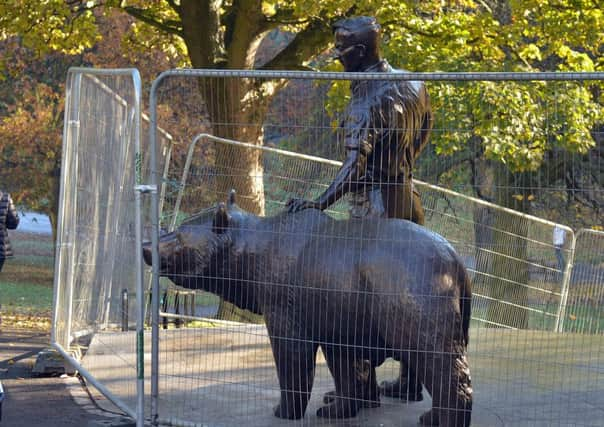From the Middle East to Biggar - the story of Wojek the bear


Their story really begins in 1939 with the Nazi invasion of Poland, the event which sparked off World War 2.
Despite furious resistance, the Polish armed forces were quickly overwhelmed, but many survivors of the unequal struggle escaped to carry on the war from overseas.
Advertisement
Hide AdAdvertisement
Hide AdMany Poles eventually made it to Britain and, in our uniforms, performed valiant service against Germany; a Polish squadron of the RAF was, for example, the highest scoring unit in the Battle of Britain and soldiers from that stricken land fought on just about every front.
Many Polish soldiers found themselves sent to the Western Desert to help the 8th Army in its fight against the Afrika Corps; they were joined by both servicemen and civilians rounded up by the Russians when Stalin joined in the German invasion of their homeland and released when Hitler turned on his Soviet ally.
The displaced Poles found themselves camped near Tehran in the then-Persia in the spring of 1942 when they found a wee bear, orphaned by hunters.
Although terrifying in battle, the Poles shared the British soft spot for animals and the bear, quickly dubbed Wojek, was ‘adopted’ as their new pet-cum-mascot and weaned on condensed milk, fed to him from an old vodka bottle turned into a make-shift baby feeder.
Advertisement
Hide AdAdvertisement
Hide AdNow officially part of the 22nd Artillery Supply Company. Wojek quickly acquired some very Polish habits, not least a sweet tooth and a love of beer!
He also fell into the bad habit of getting through several packets of cigarettes a week, albeit by eating rather than smoking them.
Although a growing bear, Wojek quickly became ‘one of the boys’ in the unit, taking part in their wrestling matches and even learning to salute when an officer strolled by.
He served with his comrades as they fought their way through Iraq, Syria, Palestine and Egypt. Wojek was now semi-officially granted the rank of private so that he could take his rightful place on troop transports; indeed, some British Army transport officers would rubberstamp travel documents and passes for a Private Wojeck, blissfully ignorant of the fact that he was a bear and not a Polich soldier!
Advertisement
Hide AdAdvertisement
Hide AdWhen the Poles had to choose a badge for their gunnery unit, there was little debate over the design - Wodjek carrying an artillery shell.
Soon his fame spread and every unit of the Polish forces regarded Wojek as their mascot.
When the war drew to a close, the Polish units were posted to Scotland while their eventual fate was decided; although the hated Nazis were defeated, Poland was now far from free, being under Soviet occupation.
During this period, Wojek very much became a ‘celebrity’ in the south of Scotland where the Poles were stationed, including Biggar.
Advertisement
Hide AdAdvertisement
Hide AdHe was officially ‘demobbed’ in 1947 and, like many of his Polish ex-comrades, stayed on in Scotland, Wojek finding a home in Edinburgh Zoo where he became a much-loved attraction, finally dying at the age of 21 in 1963.
The legend of Wojek the Bear, however, lived on.
It was over a decade ago that plans were first laid to create a statue to commemorate this unique link between the orphaned animal and the men who adopted him, a celebration of how humanity and kindness can survive even the most vicious of wars.
Several years ago a model of the then-proposed statue of Wojek with one of his Polish soldier comrades took pride of place in an exhibition at Biggar Museum, dedicated to the time when Polish forces were stationed there.
Now, after much debate about an appropriate setting for it - sites by the Forth Bride and Edinburgh Zoo were considered - Princes Street Gardens is where the twin figures will stand for eternity, a bear from Iran and a warrior from Poland, forever at the heart of the capital city of the land they came to consider their home.